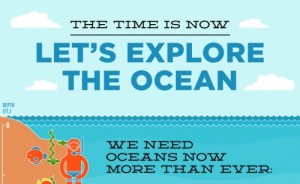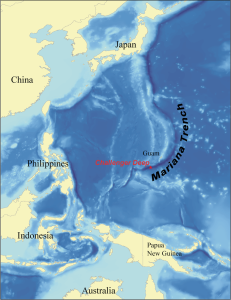This infographic from MastersDegree.net has a lot of great information about the oceans and how the diverse geography and ecology affects human life on Planet Earth.

Inner Space vs. Outer Space
What I find most interesting is the fact that so little exploration has been done on the deepest parts of the oceans. In fact, explorers have only been to the bottom of the ocean’s deepest trench 2 times in history. Once in 1960 and once back in March when Film Director James Cameron, with his own money, took a submarine to the bottom of the Challenger Deep in the Mariana Trench.
The first human to reach the 6.8-mile-deep (11-kilometer-deep) undersea valley solo, Cameron arrived at the bottom with the tech to collect scientific data, specimens, and visions unthinkable in 1960, when the only other manned Challenger Deep dive took place, according to members of the National Geographic expedition. [National Geographic]
The Mariana Trench
The Mariana Trench is the deepest part of the oceans. It’s DEEEEEP and very hard to get to. If you go by how many people have need there, it is harder to get to than an orbit in space, or even the Moon.
The Mariana Trench or Marianas Trench[1] is the deepest part of the world’s oceans. It is located in the western Pacific Ocean, to the east of the Mariana Islands. The trench is about 2,550 kilometres (1,580 mi) long but has a mean width of only 69 kilometres (43 mi). It reaches a maximum-known depth of 10.994 km (10,994 ± 40 m) or 6.856 mi (36,069 ± 131 ft) at the Challenger Deep, a small slot-shaped valley in its floor, at its southern end,[2] although some unrepeated measurements place the deepest portion at 11.03 kilometres (6.85 mi). [Wikipedia]

-Mike











Add comment